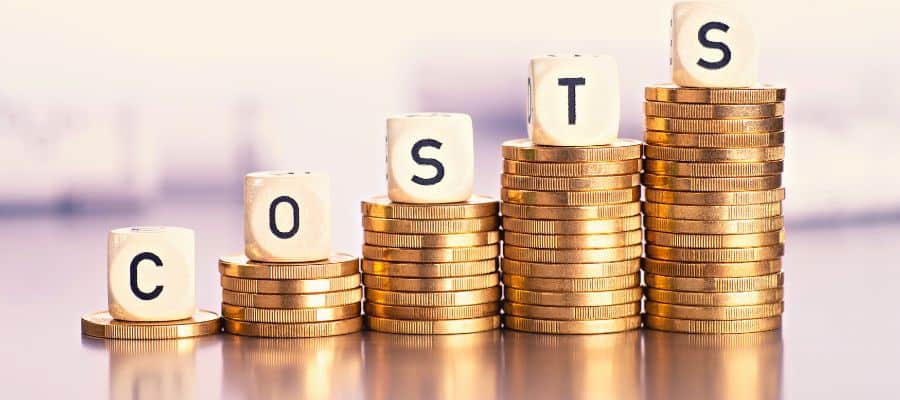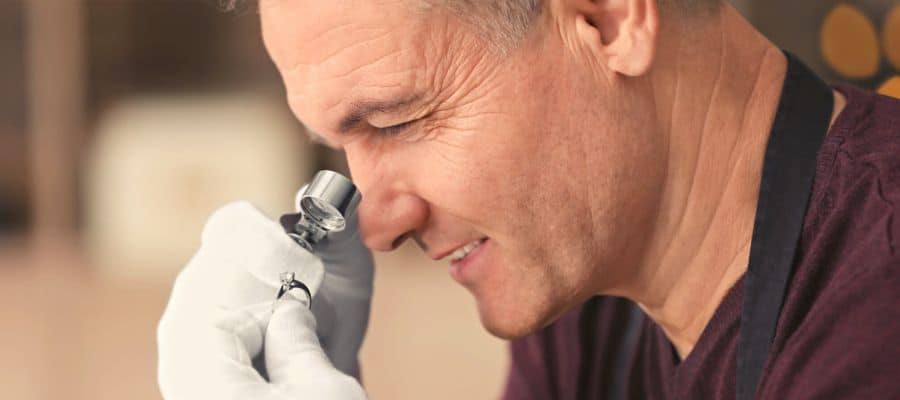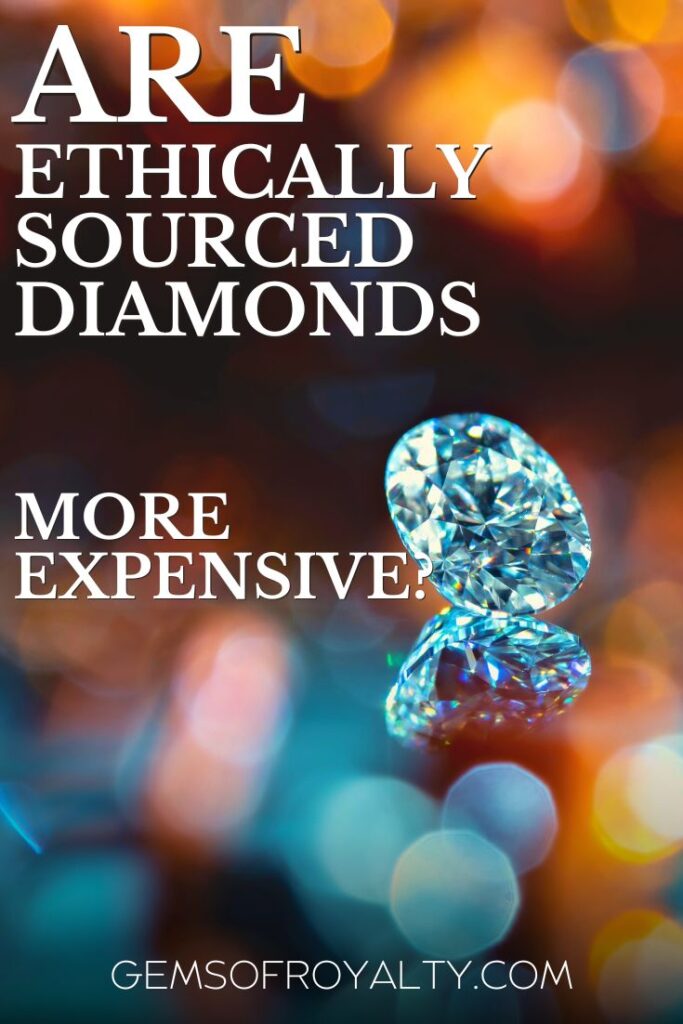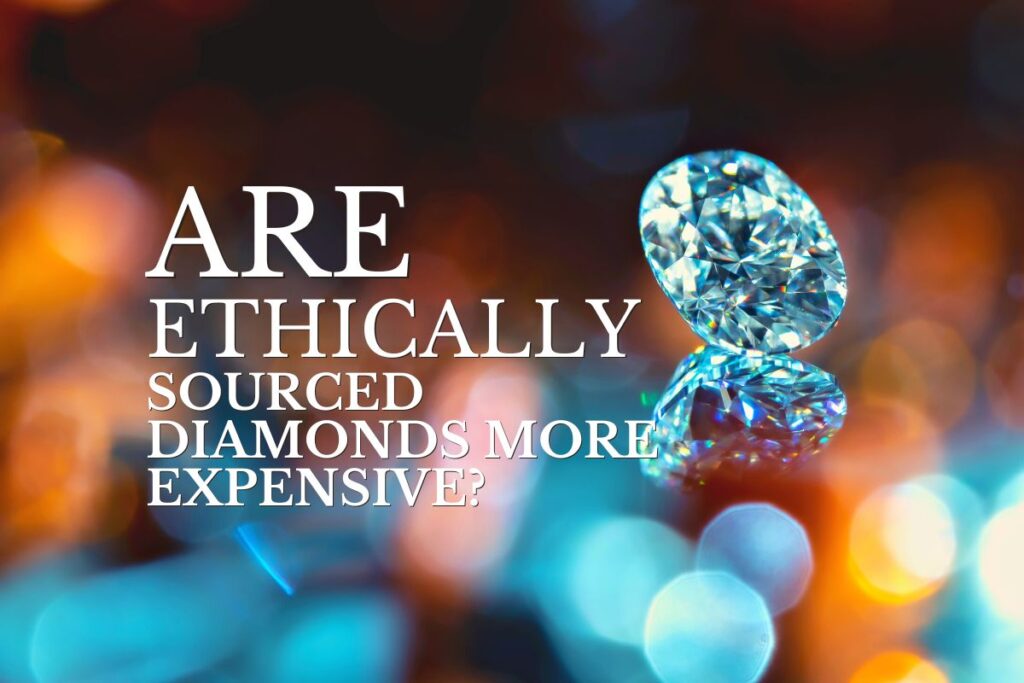As more information has been revealed about the diamond industry and conflicts and human rights violations related to it, many have become much more diligent about the origin of their most prized jewelry. Luckily, partners looking to propose to the one they love and diamond enthusiasts can still invest in a gorgeous ring without contributing to the human suffering that has been linked to the industry. However, can taking a moral stance cost you more money?
Ethically sourced diamonds are not more expensive than their traditionally-sourced counterparts. In fact, a variety of ethically-sourced diamonds, lab-grown ones, are actually far cheaper than any of the traditional options. The price of diamonds is driven up by demand, not by labor costs.
In fact, you might be surprised to learn that ethically-made lab-grown diamonds can cost anywhere from 40% to 60% less than naturally mined ones. Still, there’s a lot of thought that should go into finding the right diamond, including verifying its origin, so read on below as I expand on some of the reasons why you should always opt for an ethically-sourced diamond, along with some practical tips on how to find one.
Why You Should Always Go for Ethically-Sourced Diamonds

Ethically sourced diamonds come in two varieties: lab-grown and naturally mined. Yes, naturally mined diamonds can still be considered ethically sourced, so long as their extraction process has been conducted in a way that respects the environment and, more importantly, human rights. However, these stones are definitely rarer than their lab-grown counterparts, which, as you’ll learn below, don’t deserve the bad rep they so often get among purists.
With that said, let’s take a deeper look into some of the reasons why you should always go for ethically-sourced diamonds:
You’re Not Indirectly Contributing to Human Suffering and Environmental Exploitation
If you’ve never heard of the term “blood diamonds,” you’re about to learn the reason why so many buyers are shying away from investing in traditionally-mined pieces. I’m not going to get into a deep exploration of the world of horrors that is that of blood diamonds; after all, that’s not the point of this piece. However, if you’re interested in learning more, check out this article by Time Magazine.
Here’s what you should know – violence has always been associated with the industry of diamond mining. Many of the gorgeous pieces you see in stores are preceded by a history of forced labor, torture, violence, and even murders.
Most diamonds come from Africa, and a good percentage of them are mined in active war zones, where miners and workers are treated inhumanely, and earnings are often used to fund armed rebel movements against the government. These, as expected, lead to irreparable socioeconomic damage and come at a high cost of many lost human lives.
Therefore, the simple act of buying a gorgeous-looking diamond in a store might lead you to indirectly contribute to the human suffering and environmental damages that occur in these mining sites. Given that every consumer votes with their dollars, being careful when choosing where your hard-earned money goes (especially this much of it) can be of the essence.
You’ll Be Supporting Fair, Ethical Practices

By purchasing lab-grown or ethically-mined diamonds, you’ll be contributing to a fairer, more ethical industry you can feel comfortable purchasing from.
If you’re set on getting natural diamonds, choosing one mined in Canada is usually a safe choice. Typically, the country enforces strict humanitarian and environmental policies on all industries operating in it, and diamond mining is no exception.
However, if you’re open to the idea of lab-grown diamonds, I’m here to tell you that they’re one of the best investments you can make, despite what mining companies may want you to believe.
If you think about it, there’s no valid reason not to invest in a lab-grown diamond – you’ll get the same exact product for a fraction of the price. When I say the same exact product, I mean identical; there’s absolutely no chemical or structural difference between diamonds grown in a lab and those mined on the earth, which is why so many scientists find it baffling that customers still opt for the traditional version of the stone.
If tradition is what you’re worried about, you may find it interesting to learn that purchasing diamond rings as an engagement gift isn’t an actual tradition but rather a wildly successful marketing scheme by De Beers, the monopoly currently controlling most of the earth’s diamonds.
So, while gifting someone you love diamond jewelry is still a lovely gesture, you won’t be “dishonoring” any traditions by purchasing a gorgeous, reasonably-priced lab-grown stone.
If you’re still not sold on man-made diamonds, there are still ways for you to buy diamond jewelry sustainably and by not spending a fortune. Reusing an old family ring, for example, is a great way to send a sweet message to your loved one while still being financially possible.
At the end of the day, you’ll sleep better knowing that your token of love is just that and that its beauty isn’t overshadowed by a history of suffering and abuse. Knowing that, I can guarantee that that diamond will seem way shinier.
Best of all, if enough people took a stance and invested their hard-earned money in an ethical industry, massive improvement would be made not only to the lives of people suffering from the current diamond mining processes taking place on the other side of the world but also to the environment as a whole.
It’s Cost-Effective

One would expect the ethically-sourced version of a product to cost way more than its “traditional” counterpart. After all, that’s the case with most products on the market. Surprisingly enough, the opposite is true of diamonds.
As you can see, taking that extra bit of time to find a piece of jewelry that’s made following ethical practices isn’t only a great choice overall but also cost-effective. Some of you might say: “Well, of course, the price of lab-grown diamonds is going to be lower since fewer resources are needed in their creation. But what about the stones that are actually mined ethically? How can they be cheaper than the more crassly made option?”.
You see, one thing you might not know is that the price of diamonds is actually driven up by the difference created in the market between their supply and demand, not the actual labor costs themselves.
Some even go as far as to speculate that the De Beers corporation has created an “artificial scarcity” around diamonds. This means that diamonds aren’t really as rare as we’re led to believe; however, the monopoly intentionally keeps its supply low to be able to maintain higher prices.
However, this theory has yet to be confirmed, so we don’t know for sure whether that’s really the case or not. Either way, the fact of the matter is that there’s a high demand for diamonds, and many customers are willing to spend a lot in search of the perfect ring.
That’s where diamond companies make their revenue. The differences in labor costs between companies that operate ethically and those that don’t are negligible in the grand scheme of things, and the former is able to still be profitable without having to increase their prices.
As you can see, there’s really no good reason not to buy an ethically-made diamond. You’ll get the same quality for a fraction of the price, and best of all, you won’t be indirectly contributing to human suffering and environmental exploitation.
Buying Ethically-Sourced Diamonds Is Easier Than You Think
While everyone would happily choose an ethically-sourced diamond given a chance, some might shy away from the idea under the false impression that actually finding such a diamond is difficult and time-consuming. Luckily, that’s not actually the case.
For starters, all jewelers have made a point to work with ethical mining companies and labs in order to offer their customers jewelry whose history they feel comfortable with. So, if you were to visit your local jewelry shop and ask for an ethically-sourced diamond, chances are they’ll have an arrow of options ready for you, complete with certified proof of origin, in a matter of minutes.
If you don’t even have the time to go shopping around in person, you can easily find plenty of online shops that exclusively sell ethically-sourced diamonds. The best thing about online shopping is that you can easily look up reviews and past customer experiences to make sure that you’re dealing with a reliable supplier.
However, if you do end up buying a ring online, make sure to first inquire about the company’s shipping and return policies. You’ll be making a big investment, so it’s essential to ensure that you can make your way out of any potential issues.
Your Token of Love Will Hold More Personal Value
I’ve briefly touched on this aspect of sustainably-sourced diamonds several times throughout this article; however, it deserved a separate mention.
An engagement ring is a symbol of ever-lasting love and appreciation, two beautiful sentiments you don’t want to be overshadowed by a history of violence and suffering. After all, the whole beauty of an engagement ring lies in the sentiment it holds, and making sure no people had to be tortured or murdered for that ring to make its way to your loved one’s hand can sure make it hold that much more sentimental value.
How To Choose an Ethically Sourced Diamond

Since there are virtually no downsides to getting an ethically-sourced diamond, you’re likely wondering what’s the easiest, safest way for you to get one yourself. Luckily, the process isn’t as complicated as it might initially seem. Still, in this section, I’ll be covering some practical tips to help you find your “blood-free” diamond in no time.
- Choose a stone that’s sustainable as well. While most ethically-made diamonds are sustainable as well, that’s not always the case. That’s why it’s always better to find a jeweler that offers verifiable documentation along with its products, proving that the pieces are ethically and sustainably sourced.
- If possible, research the diamond you’re interested in. Good-quality diamonds will have an ID inscribed in them. You can use that number to research the exact stone you’re looking at and verify its sustainability.
- Don’t be afraid to ask questions. You’ll learn a lot about a retailer and its integrity by noticing how they respond to tough questions. Ask them how they source their diamonds and what’s their stance on unethically-mined ones. If they seem hesitant or skirt around the question, you can rest assured that that’s a retailer you don’t want to give your money to.
- Consider the country of origin. There’s no shortage of jewelry stores that claim to only sell ethically-sourced diamonds while the facts say otherwise. For example, if in the stone’s certificate you see that it was mined in a third-world country that doesn’t hold companies responsible to high ethical standards, you have your answer. Diamonds from Canada and Botswana, on the other hand, are usually a safe choice.
- Don’t fall for marketing schemes. Since the issue of blood diamonds is becoming more prominent, retailers have started making an effort “re-packaging” their unethically sourced products with buzzwords to help them sell better. For example, they show the word provenance next to a reputable-sounding country. However, provenance refers to the last place the stone was before it got to you, not its actual origin.
- Research brands and models online. If you’re not sure whether to trust the information you’ve been given and the product you’re interested in doesn’t have a traceable ID, you can simply research its retailer or model to find out more about whether its origin has been certified by an independent third party.
Conclusion
Knowing that the gorgeous diamond you spent so much time and hard-earned money buying for the person you love may have contributed to human suffering can cast a shadow on what is supposed to be one of the most unforgettable experiences of your life. That’s why opting for ethically sourced diamonds is an excellent choice, not only from a moral lens but from a financial one as well.
Therefore, upon seeing a beautiful diamond, make sure to ask for information proving that the piece of jewelry is ethically sourced and conflict-free.
If you found this article useful, make sure you save this pin below to your Jewelry board.


